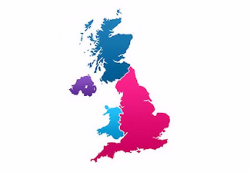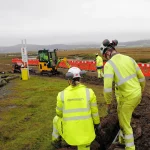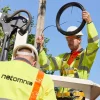Broadband Delivery UK Gets New CEO and Date for GBP10m Competitive Fund

The Government’s Culture Secretary, Maria Miller, confirmed during a meeting yesterday that the former Commercial Director of the London 2012 Olympics Organising Committee, Christopher Townsend, would now lead its Broadband Delivery UK (BDUK) project. A launch date for the new £10m Competitive Fund for rural areas was also revealed.
At present the BDUK project aims to make fixed line superfast broadband (25Mbps+) ISP services available to 95% of the country by 2017 (rising to 99% by 2018 with mobile and fixed wireless solutions), although its first traunch of £530m in public funding has, save for admin costs, been almost entirely scooped up by BT during a process where all of the operator’s rivals dropped out over a mix of economic and competition concerns.
Advertisement
Since then the central UK Government has allocated a further £250m to its BDUK project (here), which is intended to focus upon helping to pass the final 10% or so of the country with a superfast broadband service (i.e. the first £530m allocation aims to reach 90% by around the end of 2015 or early 2016).
But last year a series of scathing reports from the National Audit Office (here), Public Accounts Committee (here) and various other groups forced the Department for Culture Media & Sport (DCMS) to re-organise spending of the £250m around a more commercial focus (here). In fairness not all of the heavy criticism was fair or accurate (here) but some of it certainly was.
At this stage we still don’t know the specifics of how that £250m will be spent but more than a few observers still expect BT to be the main beneficiary and indeed much of the news we’ve covered from Local Authorities in recent months appears to suggest a similar outcome, with most appearing to look towards BT for any future expansion plans.
Never the less DCMS has spent the past few months re-shuffling its entire BDUK office around a more commercial focus and the appointment of Christopher Townsend, whom will receive a salary and bonuses worth £200,000 per annum, is only the latest development in that on-going drive.
Advertisement
Chris Townsend, CEO of BDUK, said:
“Ensuring that broadband can reach businesses and consumers across the country is one of the most important policies in Government. Faster connections will improve the way people live, work and spend their leisure time. I look forward to starting my new role as chief executive of BDUK and building on the good work being done to get superfast broadband to people all over the UK.”
Meanwhile yesterday’s meeting, which we first highlighted on the 4th January 2014 (here), was also focused on discussing the Government’s new £10m Competitive Fund to help the most remote rural areas receive better broadband access.
The fund broadly aims to “test innovative solutions to deliver superfast broadband services to the most difficult to reach areas“, which could include “enhanced mobile services, new fixed technologies and alternative approaches to structuring financial support, working closely with the communications industry“ (i.e. fixed wireless 4G, Satellite, FTTH and FTTC). Mobile operators are likely to be among the primary beneficiaries.
Maria Miller, Culture Secretary, said:
“If we want to ensure that all communities can benefit then we need to think imaginatively about alternative technology, and the pilots enabled by the £10m fund will be instrumental in helping us overcome the challenges of reaching the final 5% of premises.”
A short press release has revealed that the new fund will open to applications from pilot projects on 17th March 2014, although £10 million is just a tiny drop in the ocean for remote rural communities where populations are typically sparse and the land extremely wide.
Meanwhile some might see the new investment as a watered down replacement for DEFRA’s £20m Rural Community Broadband Fund (RCBF), which has struggled to help the same final 5-10% of rural areas gain access to a “fibre broadband” based service; mostly due to a seemingly deliberate lack of necessary speed and coverage data from BT and related local authorities (here).
Advertisement
At the end of the day the country’s broadband infrastructure is improving and a number of reports, such as those from Ofcom and various other analysts, have indicated that this is occurring at a much more rapid pace than many other EU states. As a result more and more ordinary consumers, most of whom just want a decent connection and tend to pay very little attention to the underlying infrastructure, are able to access better connections. But how future proof the dominant hybrid-fibre (FTTC) approach is remains somewhat open to debate, although VDSL Vectoring, G.Fast and FTTdp do show some promise.
On the other hand the last 10% of rural areas have yet to see much in the way of an improvement and many promising schemes have been slowed, stalled or scuttled by BDUK and the RCBF’s existing approach. The question now is what kind of tangible improvement will all of these changes actually make or will BT continue to take the lion’s share, with many councils appearing to be too risk averse to consider alternatives.
Mark is a professional technology writer, IT consultant and computer engineer from Dorset (England), he also founded ISPreview in 1999 and enjoys analysing the latest telecoms and broadband developments. Find me on X (Twitter), Mastodon, Facebook, BlueSky, Threads.net and Linkedin.
« UBS Analysts Speculate on BSkyB Merger with Vodafone or O2 UK





















































Comments are closed